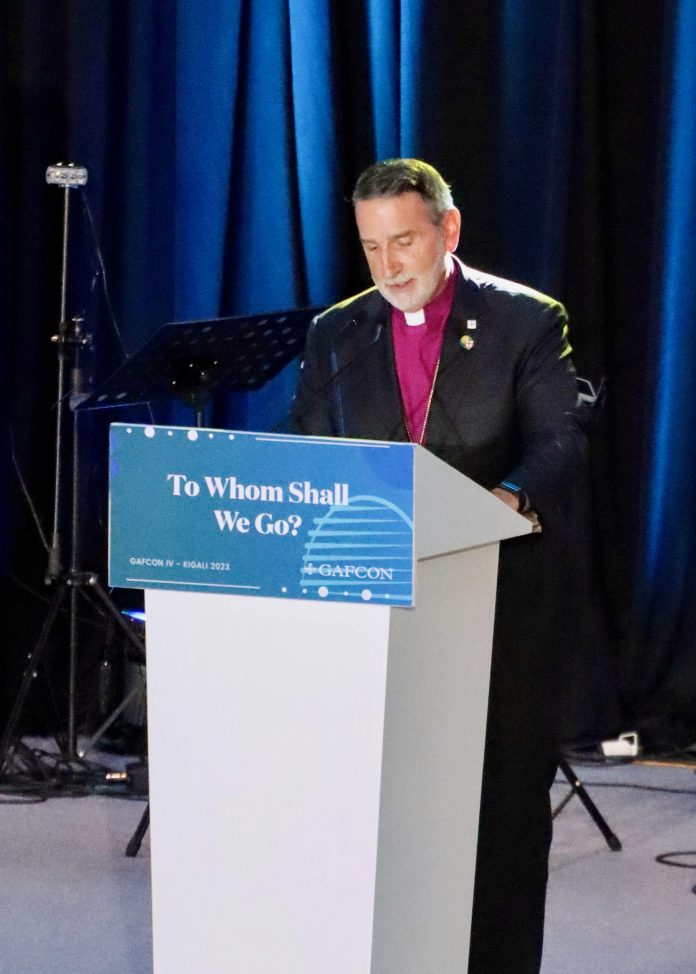Hans Boersma, Gerald McDermott, and Greg Peters have expressed concern at First Things that, because the Kigali Commitment “repeatedly appeals to the authority of the Bible alone and fails to mention either the authority of the Church or the role of tradition,” GAFCON is committing itself to a “strict ‘Bible alone’ viewpoint” that is “a departure from the approach of the English Reformers.” Moreover, they suggest that the Commitment’s affirmation of “leadership roles of GAFCON women in family, Church and society” is evidence that the GAFCON bishops have already “opened the door to the use of Scripture for liberal ends,” as “this statement implicitly ratifies women’s ordination to the diaconate, priesthood, and episcopacy.”
There are two objections here: first, that the absence of tradition in the Kigali Commitment suggests a larger indifference to tradition, and second, that the Commitment’s affirmation of “leadership roles of GAFCON women in family, Church and society” is a manifestation of this indifference.
Beginning with the first objection, while it is true that the Kigali Commitment contains no references to tradition, it seems reasonable to read the Commitment in light of GAFCON’s already established principles as found on its website. On the page where GAFCON elaborates on its self-understanding as “Bible Based,” the following excerpt appears:
As well as the Bible, God has given humans reason and the historical witness of the church to discern matters of faith but GAFCON believe that Scripture is the higher authority. It is the final court of appeal for doctrine because it is His revealed will. All the foundational documents of Anglicanism, the Thirty-Nine Articles, The Book of Common Prayer and the Homilies all insist on this supreme authority.
While “Scripture is the higher authority” (as the authors of the First Things piece also recognize), the church’s historical witness is nonetheless acknowledged by GAFCON as an important resource for understanding Scripture. This relationship between Scripture and tradition, where tradition informs Scripture without taking priority over it, can also be found in Article 2 of the Jerusalem Declaration, which reads as follows:
We believe the Holy Scriptures of the Old and New Testaments to be the Word of God written and to contain all things necessary for salvation. The Bible is to be translated, read, preached, taught and obeyed in its plain and canonical sense, respectful of the church’s historic and consensual reading.
Here again we are told that the Bible should be read with respect to “the church’s historic and consensual reading.” Bishop Peter Jensen’s commentary on this Article of the Jerusalem Declaration, included on the same page, further reinforces this relationship between Scripture and tradition:
One of the glories of the Christian faith is this: that we’ve been around for a long time. And we in our present generation are not the first people to read the Bible. That may come as a big surprise to some people. In fact the Bible, Old and New Testament, has been read for 2000 years, sometimes by people who are extraordinarily faithful Christians and well able to understand, and we have the results of their reading in what we call tradition. Now this tradition we have is not the Bible. It’s not the word of God. But it’s very important that we realize that we are not the first people to read the Bible, and that we, as we listen to what others have said, can learn what they have said about what the Bible says. (3:17‒4:23)
Later in the video, Jensen adds this: “One of the ways we have of checking our reading of the Bible is to go and ask ourselves, ‘Well, how has the Bible been read since the beginning?’” (4:51‒5:00)
Read it all in the North American Anglican










